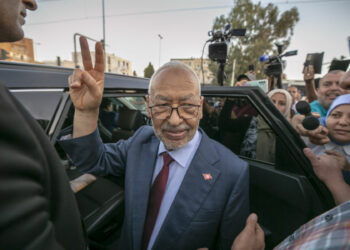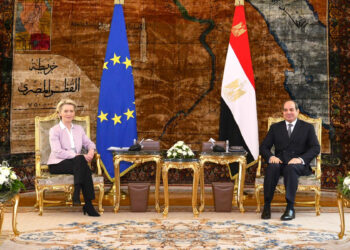عربی
On February 16, Egyptian security forces stormed the homes of six relatives of Egyptian-American activist Mohamed Soltan and arrested two of them. Weeks earlier, the Egyptian authorities arrested the cartoonist Ashraf Hamdy, who had published a video criticizing Egyptian security forces on the 10th anniversary of the January 2011 uprising.
Since the coup of General Abdel Fattah el-Sisi on July 3, 2013, detaining citizens based on their political activity has hardly stopped in Egypt, in what we might call the "era of political prisoners."
Like any repressive authoritarian regime, the Sisi regime fears anyone who opposes his rule, even if they were allies who supported him in the coup. Some of those who supported the coup are now in prison. Sisi relies on brutal repressive tools such as enforced disappearance, extrajudicial killing, seizing opponents' assets, travel bans, etc.
More importantly, Sisi has securitized the public sphere in an unprecedented way, as all economic and social issues are dealt with from a purely security perspective.
According to some estimates, the number of political detainees in Egypt reaches about 60,000 people from various political and ideological backgrounds, especially Islamists, who have been arrested during the past eight years, in addition to hundreds of ordinary people, especially women, youth and children, who have been arrested without guilt or crime. Among those detainees, about 1,058 died in Egyptian prisons from June 2013, when Sisi came to power, to 2020, as a result of torture, medical negligence or suicide. The killing shows no sign of abating. In the first two months of 2021, 12 detainees have died in custody.
The issue of political detainees in Egypt has gone through a number of transformations and changes. In the first months following the coup in 2013, most of the political detainees were affiliated or sympathetic with Islamist movements, especially the Muslim Brotherhood.
However, with the passage of time, the background of those arrested expanded, to include those secular and liberal symbols and activists who did not oppose the coup. Increasingly, the public space has been closed, and no one is allowed to demonstrate or object to political repression. There are many icons amongst the arrested political activists, such as Alaa Abdel-Fattah, Ahmed Douma, Khaled Daoud, Israa Abdel-Fattah, Solafa Magdy, Sanaa Seif, Hoda Abdel-Moneim, Mohamed Al-Qassas, Ahmed Al-Baqer, and others.
Over the past eight years, the issue of detainees has only gotten worse. Neither the regime nor the opposition at home or abroad offered a serious solution to this issue. Also, western governments have not exercised any serious pressure on the Sisi regime to stop the crackdown on dissidents and release political detainees.
On the contrary, military, political and diplomatic support from countries such as France, Germany, and the United States has remained the same for the Sisi regime, which has contributed to the poor conditions of political prisoners. Indeed, some of these countries, such as the U.S., appear to be complicit in the tragedy of political prisoners in Egypt. Former U.S. President Donald Trump described Sisi as his "favorite dictator," which Sisi understood as an American green light to do whatever he wants with political opponents, including detention, abuse and negligence in prisons.
Likewise, the Trump administration did not act to gain the release American citizens of Egyptian origin, with the exception of the activist Aya Hjjazy, which came after demands and pressures from international human rights organizations. Hijazy is free but she has not yet been compensated for her detention of more than three years between 2014 and 2017. Also, the American citizen of Egyptian origin, Mustafa Kassem, died in the notorious Tora prison after being detained for nearly seven years. Before his death, Kassem had sent a letter to President Trump, who did nothing to save his life.
With the arrival of the new administration of President Joe Biden to the White House, it is no longer possible to remain silent concerning the brutality of the Sisi regime against political opponents.
The Trump administration's shameful position on the issue of human rights in Egypt will not be improved without a major and real effort on the part of the Biden administration in the coming months. Therefore, it is necessary for President Biden to place the demand for the release of all political prisoners as an important pillar of his foreign policy towards Egypt.
The Biden administration should also conduct a comprehensive review of its strategic relationship with the Sisi regime in order to correct the accumulated mistakes made by the previous U.S. administrations regarding human rights and democracy in Egypt. There are many ways to do this.
First, U.S. officials need to send clear and strong messages to the Sisi regime that no human rights violations will be tolerated.
Second, there should be a review of the $1.3 billion in annual military aid provided by the United States to Egypt, by conditioning the aid on improvements in Egypt's record on the issue of human rights.
Third, the Biden administration should pressure the Sisi regime to allow local and international organizations working in the field of democracy and human rights, including the National Democratic Institute, Human Rights Watch, Amnesty International and others, to freely conduct their activities in Egypt.
Fourth, there should be immediate release of American citizens of Egyptian origin detained in Sisi's prisons.
Fifth, there should be an explicit and unequivocal demand to Sisi not to harm the families and relatives of activists and political opponents. Finally, a greater portion of U.S. aid to Egypt should be allocated to civil society organizations working in the field of human rights and democracy support.
In other words, there is an urgent need for a paradigm shift in U.S.-Egyptian relations so that the issue of human rights is at the heart of these relations. The continuation of these relations should be linked to this vital issue of human rights, as it is no longer possible to remain silent and to turn a blind eye to the violations.
This matter is not only important for Egypt to become a stable and prosperous country that respects its great people, but also for it to become a reliable strategic ally that will contribute to the realization of the interests of the United States in the Middle East. Therefore, the United States has a political and moral responsibility towards the release of political prisoners and opponents in Egypt.
In his electoral campaign, President Biden pledged that he would not give Sisi a "blank check" and would not consider him his "favorite dictator" like Trump. We are still waiting for these words to turn into actions.
Photo credit: Hungarian Prime Minister Viktor Orban and Egyptian President Abdel Fattah el-Sisi review an honor guard in Budapest, Hungary, June 5, 2015. (Photo by Hungary Prime Minister's Press office/Anadolu Agency via Getty Images)







